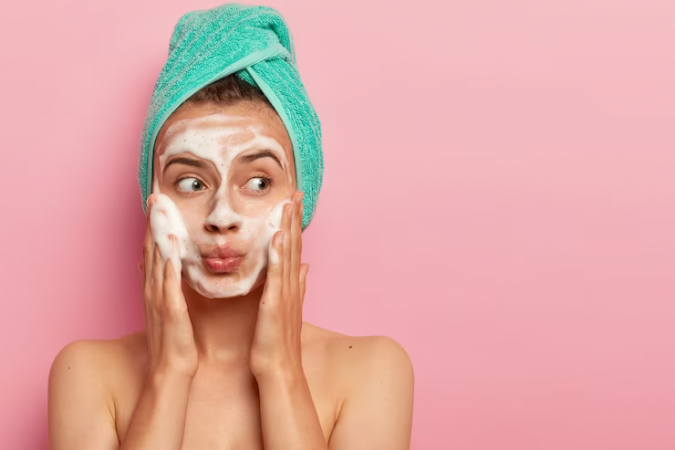
During the monsoon season, your skin undergoes significant changes due to increased humidity and occasional heavy rains. These conditions can lead to various skin issues such as excess oiliness, fungal infections, acne breakouts, and dull, patchy skin.
Humidity levels rise during the monsoon, causing your skin to produce more oil than usual. This excess oil can make your skin feel greasy and prone to acne breakouts.
The combination of warmth and moisture during the monsoon creates a perfect environment for fungal infections to thrive. Common fungal infections during this season include ringworm, athlete's foot, and jock itch.
Clogged pores due to sweat, dirt, and excess oil can lead to increased acne breakouts during the monsoon. Proper skincare is essential to prevent and manage acne.
Excessive humidity can disrupt the skin's natural exfoliation process, leading to a buildup of dead skin cells. This buildup can result in dull, uneven skin tone and texture.
To maintain healthy and glowing skin during the monsoon season, it's crucial to adopt a skincare routine tailored to address these specific challenges.
Use a Gentle Cleanser
Switch to a gentle, hydrating cleanser that effectively removes dirt, oil, and impurities without stripping away essential moisture. Look for cleansers with ingredients like glycerin or hyaluronic acid, which help hydrate the skin.
Double Cleansing
Consider incorporating double cleansing into your skincare routine, especially if you wear makeup or sunscreen. Start with an oil-based cleanser to dissolve makeup and impurities, followed by a water-based cleanser to deep clean the pores.
Lightweight Moisturizer
Opt for a lightweight, non-comedogenic moisturizer that provides hydration without clogging pores. Water-based moisturizers or gel formulations are ideal for oily or combination skin types during the monsoon.
Hydration
Maintain optimal hydration levels by drinking plenty of water throughout the day. Hydration from within helps plump the skin and improves its overall appearance.
Broad-Spectrum Sunscreen
Apply a broad-spectrum sunscreen with at least SPF 30 every day, regardless of whether it's sunny or cloudy. UV rays can penetrate through clouds and cause skin damage, so sunscreen is essential year-round.
Reapplication
Reapply sunscreen every two hours, especially if you're outdoors or exposed to rain. Water-resistant sunscreen formulations can provide protection even if you get wet.
Oil-Free Products
Switch to oil-free or mattifying skincare products to help control excess oil production. Look for products labeled "non-comedogenic," which means they won't clog pores.
Blotting Papers
Keep blotting papers handy to absorb excess oil throughout the day. Gently blot the skin, focusing on the T-zone and areas prone to oiliness.
Keep Skin Dry
Prevent fungal infections by keeping your skin dry, especially in areas prone to sweating such as underarms, groin, and feet. Use absorbent powders if necessary.
Antifungal Powder
Apply antifungal powder to areas susceptible to moisture buildup, such as between toes and under breasts. This helps prevent fungal growth and maintains skin health.
Exfoliate Regularly
Incorporate gentle exfoliation into your skincare routine 1-2 times a week to remove dead skin cells and prevent clogged pores. Exfoliation promotes cell turnover and helps reveal smoother, brighter skin.
Avoid Harsh Scrubs
Avoid using harsh scrubs or exfoliants that can irritate the skin, especially during the monsoon when the skin's barrier may be more sensitive. Choose exfoliating products with mild ingredients like jojoba beads or fruit enzymes.
Eat Fresh Fruits and Vegetables
Include a variety of fresh fruits and vegetables in your diet, as they are rich in antioxidants and vitamins that promote healthy skin. Foods like berries, spinach, and bell peppers support skin health from within.
Herbal Teas
Drink herbal teas such as chamomile or green tea, which have detoxifying properties and help flush out toxins from the body. Herbal teas also contribute to overall hydration.
Breathable Fabrics
Choose clothing made from natural, breathable fabrics like cotton or linen. These fabrics allow air circulation and prevent sweat buildup, reducing the risk of skin irritation and fungal infections.
Rain Protection
Carry an umbrella or wear a raincoat to protect your skin from direct contact with rainwater, which can contain pollutants and irritants. Wet clothing can also contribute to skin problems if not changed promptly.
Night Cream
Apply a nourishing night cream before bed to replenish moisture and repair the skin overnight. Look for night creams with ingredients like ceramides, peptides, or hyaluronic acid for added hydration and anti-aging benefits.
Clean Bedding
Regularly change your pillowcases and bedsheets to prevent the buildup of oils, dirt, and bacteria that can transfer to your skin while you sleep. Clean bedding promotes clearer skin and reduces the risk of breakouts.Taking care of your skin during the monsoon requires a proactive approach to address increased humidity, oiliness, and the risk of fungal infections. By following these effective skincare tips consistently, you can maintain healthy, radiant skin throughout the rainy season.
The new Skoda Kodiaq will be launched in 2025, will step forward with new technology
Before the launch of BMW's new 5 Series LWB, know the review of this car
iPhone 15 Pro Max vs Google Pixel 8: Which Smartphone Is Better?